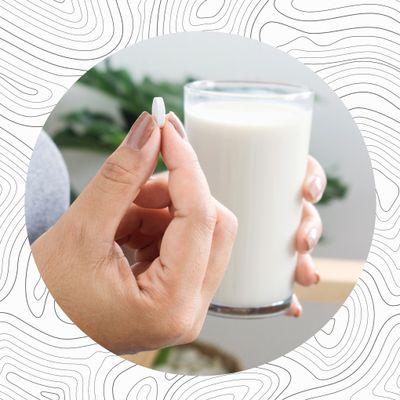
Thanks to the tireless work of Big Yogurt, most of us grew up knowing that calcium makes for healthy bones, and that we should get lots of it. But once we’re grown, is calcium still as necessary? Like many people, I’ve heard that the “window” for calcium absorption closes in your 20s, so you don’t need as much after that. But is this true? And if not, can calcium supplements help?
As it turns out, there’s some truth to the rumors — your calcium needs do fluctuate depending on how old you are. During childhood and adolescence, your growing bones and teeth absorb more calcium than they do in early and middle adulthood, says Dr. Peter Goulden, who specializes in bone diseases, diabetes, and endocrinology at Mount Sinai. Then, in your later years, your bones require more calcium again as they start to break down. But calcium isn’t just important for your skeletal system, he adds. “It’s also present in the blood, intracellular fluids, muscles, and soft tissues. It has a lot of functions.”
For these reasons, the amount of calcium that the National Institutes of Health recommends depends on your age. Between 9 to 18, you should get about 1,300 mg a day; from 19 to 50, you only need about 1,000 mg a day. Beyond the age of 50, women are advised to get 1,200 mg a day, whereas men don’t need to raise their levels until they’re 70 because they tend to have higher bone density. Meanwhile, some health conditions — like inflammatory bowel disease — can affect how readily your body absorbs calcium, and may require you to ingest more.
You may have heard that anyone who’s pregnant or breastfeeding needs more calcium, but their recommended amount doesn’t actually change, says Dr. Goulden. However, it does become all the more important that you hit your daily quota. “A baby’s calcium needs are supplied by the mother’s diet, so if she doesn’t get enough, then calcium might be transferred from her bones to your baby,” he explains. That sounds terrifying — calcium being leached from your skeleton! — but Dr. Goulden reassures me that bone mass lost in pregnancy is typically regained shortly after childbirth or the end of breastfeeding.
If you’re pregnant and worried you’re not getting enough calcium through food and drinks, Dr. Goulden recommends speaking with your health provider. Prenatal vitamins tend to contain about 15–30 percent of your recommended calcium intake, so it’s not enough to rely on them alone, but they do help.
Overall, the best way to meet your daily requirement — pregnant or breastfeeding, old or young — is through your normal diet. And while 1,000 mg may sound like a lot, Dr. Goulden says it’s generally quite achievable. For instance: “About eight ounces of yogurt at breakfast would give you about 400 mg, and if you had a cup of milk in your coffee, that’s another 300 mg,” he suggests. “A serving of cheddar cheese is about 300 mg, and half a cup of tofu would give you 250 mg.” He also notes that vegetables like kale and bok choy are fairly calcium-rich, and nondairy milks like oat, soy, and almond often have a good calcium profile, too — just check the label to be sure.
So who needs calcium supplements? If you’re a picky eater, avoid dairy, or otherwise suspect you aren’t getting enough calcium from your regular diet, they could be helpful. There are two kinds to choose from: calcium carbonate and calcium citrate. Calcium carbonate offers more elemental calcium (the type your body can absorb for bone health), while calcium citrate offers a bit less. For that reason, Dr. Goulden says that carbonate is better for most people. However, it does require more stomach acids for absorption, so if you have any kind of health condition or are on medication that suppresses your stomach acid, you might want to try citrate instead. Carbonate should also be taken with food, but citrate can be taken anytime.
You may have noticed that vitamin D is often touted as essential for calcium absorption (for instance, many calcium supplements include vitamin D as well). There’s merit to this: Vitamin D helps the body produce a hormone it needs to absorb calcium, so taking a combined supplement kills two birds with one stone. However, you don’t have to ingest vitamin D at the same time as calcium, says Dr. Goulden. As long as you’re getting enough vitamin D in your diet, that should do the job. For women between the ages of 19–70, the recommended daily amount of vitamin D is 600 IU; for reference, just three ounces of cooked salmon would get you about 70 percent there. Finally, there’s some evidence to suggest that taking calcium supplements with vitamin C might help absorption, so you could take yours with some fruit juice if you want an extra boost.
Calcium deficiency can show up as muscle aches and cramps; numbness or tingling around the hands and feet; and dry, brittle nails that break easily. But there’s also a chance that you won’t get any symptoms at all, Dr. Goulden says, because the human body is pretty good at working with what it has.
On the flip side, it’s possible to get too much calcium, although it’s uncommon. Generally speaking, your body will just pee out any excess calcium it doesn’t need. But in some rare cases, calcium supplementation can increase your risk of kidney stones. A 2011 trial conducted by the Women’s Health Initiative found that postmenopausal women taking calcium supplements were around 17 percent more likely to develop kidney stones than those who weren’t. Either way, if you’re concerned about your calcium levels, speak to your doctor — and it probably wouldn’t hurt to have more yogurt, too.

